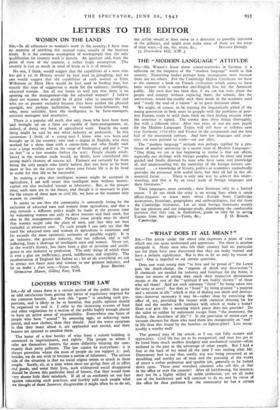THE MODERN LANGUAGE " ATTITUDE
SIR,—Mr. Wiener's letter about school-textbooks in German is a reflexion on the limpness of the " modern language" world in this country. Examining bodies perhaps keep incongruous texts because there are no others. For the Cambridge Higher Certificate we have at the moment a book on French civilisation which seems to have been written with a somewhat anti-English bias for the American public. My own fear has been that, if we cut out texts about the people and country without replacing them, the schools, like the universities, would too readily stick their heads in the academic sand and " study the soul of a nation " in its great literature alone.
We ought, of course, to be training the linguistically gifted of the young generation in both sexes to grapple with the problems of post- war Europe, ready to send them forth on their healing mission when the armistice is signed. The enemy does these things thoroughly, but with, a different ideal. After two years of war my own pupils for the Modern •Languages Tripos will still have as syllabus next year Germany 177o-187o and France in the seventeenth and the first half of the nineteenth century. And how few languages and coun- tries we even pretend to study—ask our allies.
The " modern language " attitude was perhaps typified by a pro- fessor of another university in a recent issue of Modern Languages: " One thing we are at last beginning to realise is that our affairs, especially our dealings with foreign peoples, must be more and more guided and finally directed by men who have some real knowledge of, and understanding for, the mentality of the foreign nations con- cerned . . . a knowledge of history, politics or economics undoubtedly provides the possessor with useful facts, but they all fail in this all- essential factor. . . . There is only one way to achieve this under- standing, and that is by an exact study of foreign languages and their literatures."
Their languages, most certainly ; their literature only to a limited extent. I do not think the army is on wrong lines when it sends officer-linguists to learn more about Europe from Cambridge economists, historians, geographers and anthropologists, but not from the Cambridge litterateur. Let us read foreign literatures mainly for our pleasure and our language-study, abandoning the comfortable" pretence that they can, in themselves, guide us very far in saving Europe from her agony.—Yours, &c., J. 0. ROACH. Cambridge.


























 Previous page
Previous page